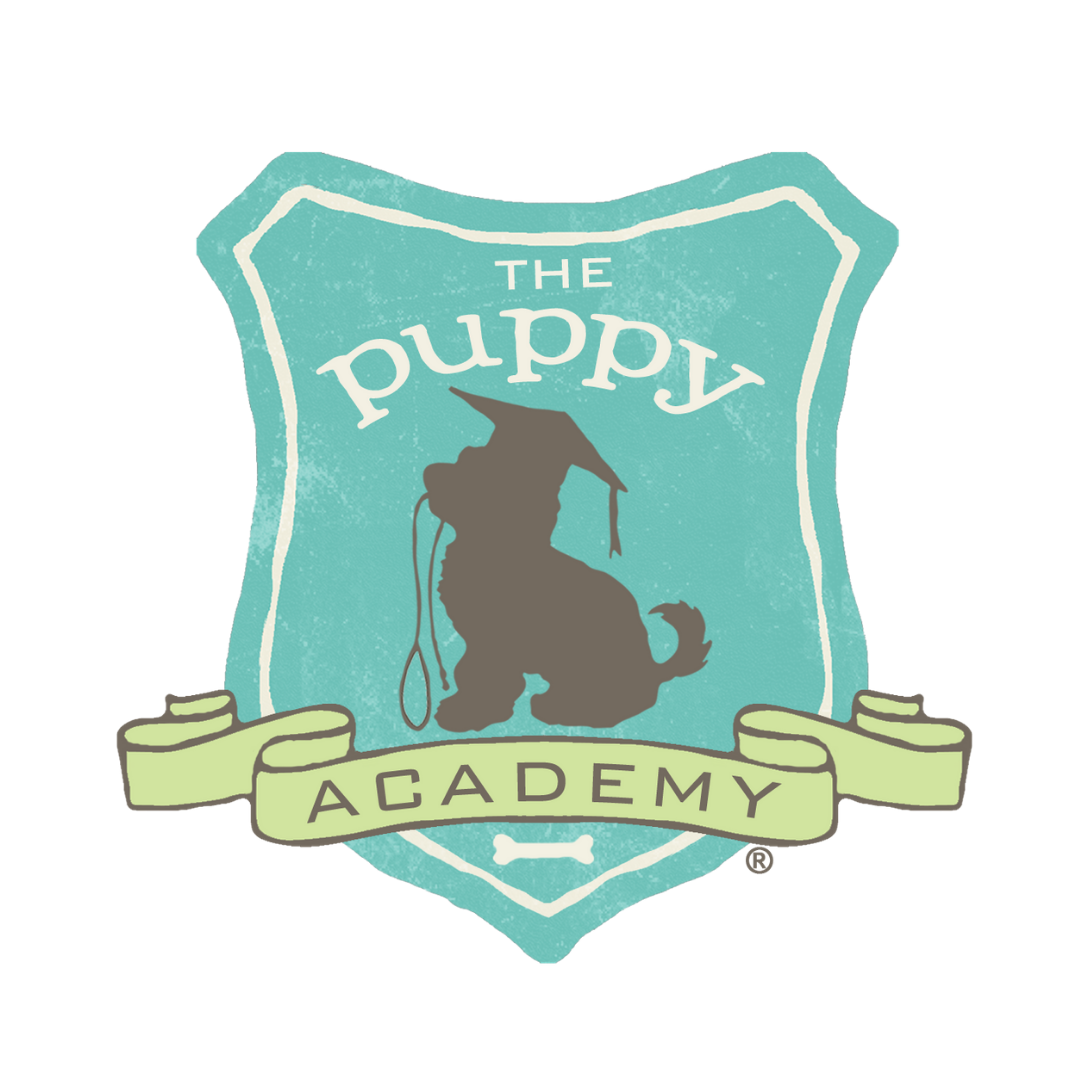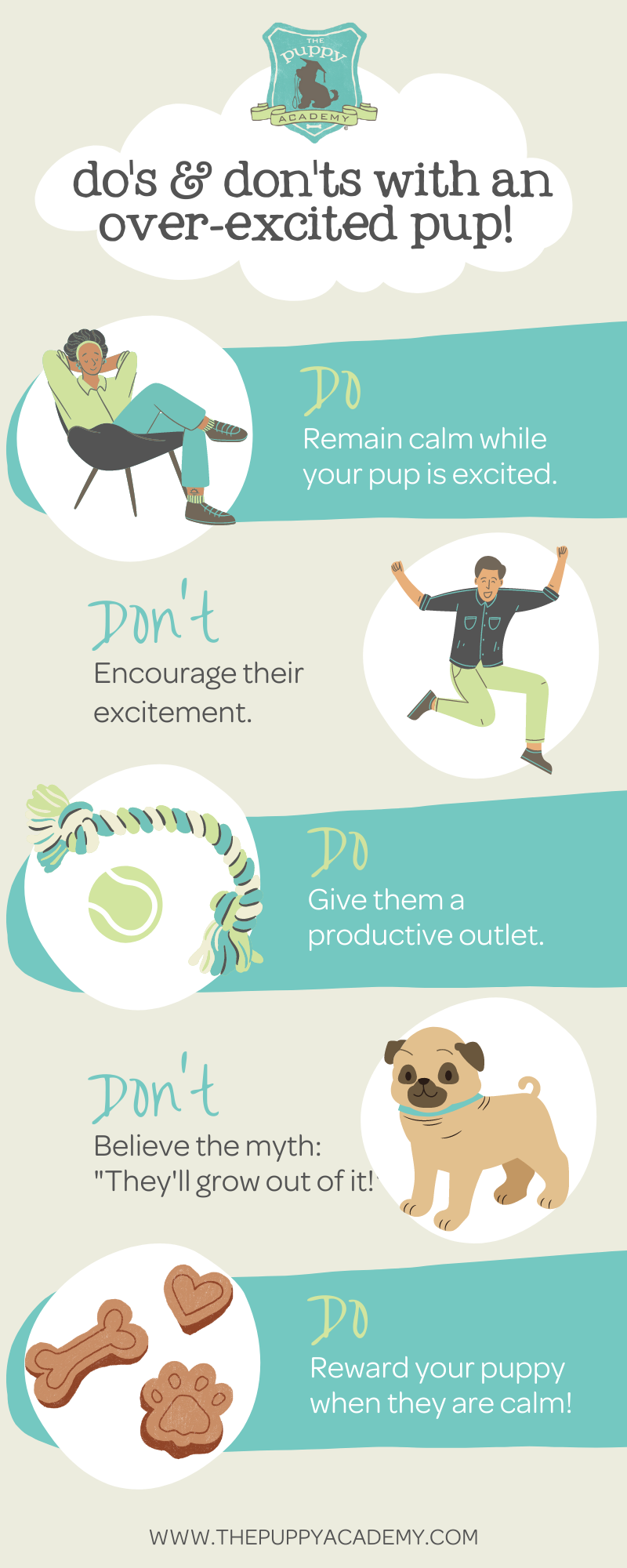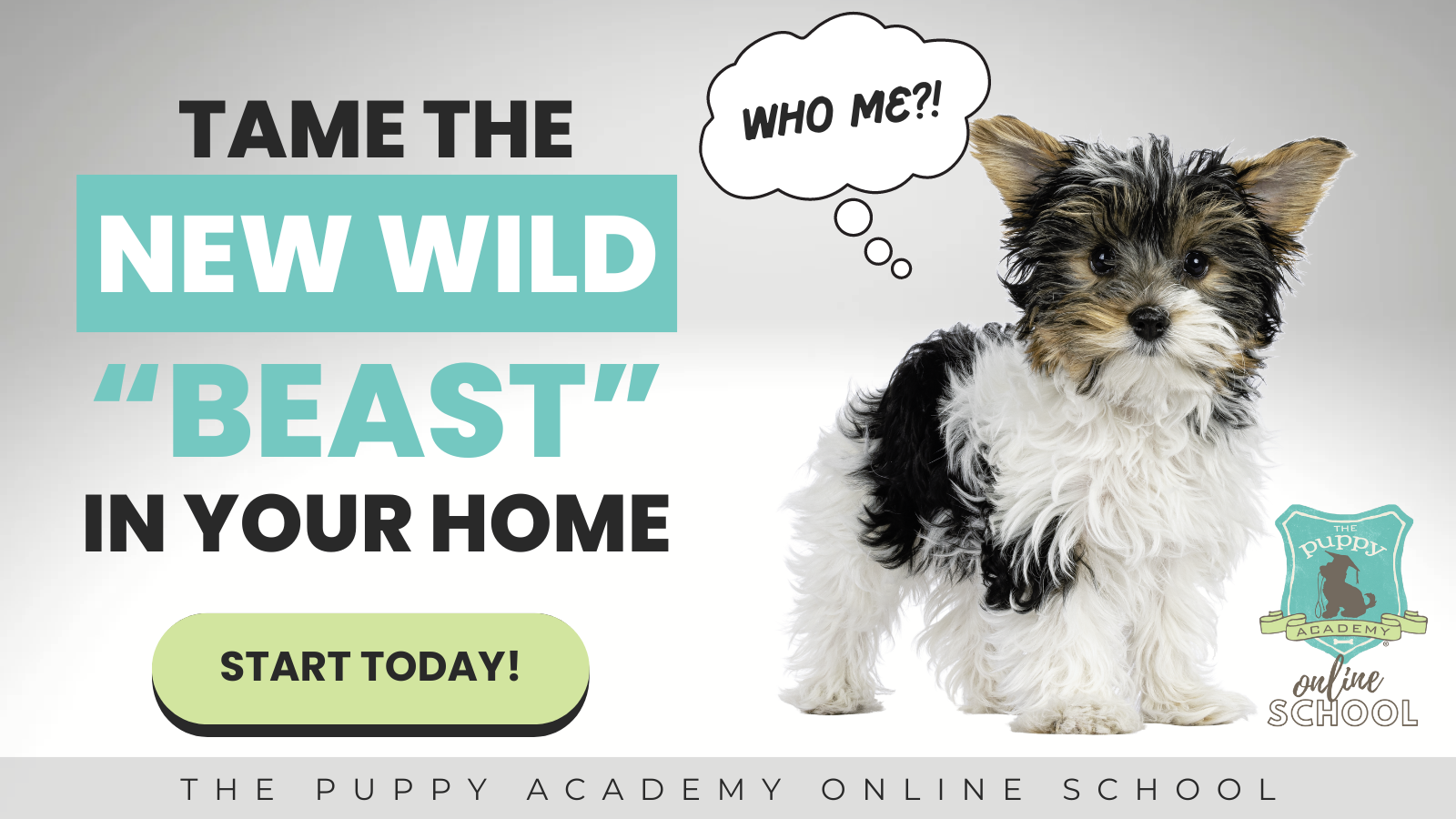Is your puppy happy, anxious, or acting out? Sometimes puppy parents have a hard time deciphering this when their pups have become so excited they can't contain it! Here are some common triggers, dos and don’ts, plus helpful puppy training tips to manage over-excitement in your pup!
The Puppy Academy student: Luna!
Jumping, barking, zoomies, and yipes…is your puppy happy, or are they actually exhibiting over-excitement behaviors? This is often what our puppy parents at The Puppy Academy come to us wondering about!
What some think is a puppy displaying happiness, is actually a state known as over-excitement, where your puppy has become hyper and aroused by something or someone. And over-excitement, which physiologically speaking releases a rush of dopamine in our pups, can become addictive, only propagating compulsive behaviors even further.
An over-excited puppy might not seem like a big deal to you now, but not managing those over-excited occurrences can lead to future behavioral issues. You might encounter times where you have a lack of control over your puppy when they are in this aroused state, making it difficult or even impossible to get them to listen to you. Or you might find your puppy needed to direct their energy onto other, potentially destructive activities. If left unmanaged as your puppy grows up, they might begin to display negative tendencies like, for example, reacting to other dogs on a leash or barking toward new people.
The issue is puppy owners don’t always know how to spot over-excitement in their pups. Additionally, they can inadvertently encourage their excitement or even try to correct it without addressing the root cause.
Knowing When Your Puppy is Getting Too Excited
So what are those over-excited behaviors to keep an eye on? If you notice that your puppy is calm one moment, and suddenly experiences a behavior change such as zoomies (uncontrollably running in circles or back and forth), jumping, mouthing and nipping, barking, spinning in circles, etc. These are all signs that your puppy has become over-excited.
And to clarify, over-excitement is different than just high-energy. Some breeds, like herding or hunting dogs, for example, are naturally prone to be more active than other breeds and may display hyperactive behaviors like the ones we mentioned earlier. Generally, though this can be managed by providing those breeds a necessary outlet like regular training or nose work games.
Over-excitement can happen in your puppy due to a sudden surprise by some new stimulus, getting aroused in an activity, or if they are anxiously anticipating something. This leads us to discuss triggers!
The Puppy Academy student: Blue!
Common Over-Excitement Triggers
If you’ve identified that your puppy is dealing with over-excitement behaviors, then the next step in managing your puppy’s excitement is to do a little investigating into what stimulates them, and watching them for changes in their behavior. And you can start off by asking yourself...
“Does my puppy pull on the leash and whine during walks?”
“Does my puppy go into zoomies when I let them go outside in the yard?”
“Does my puppy start barking or jumping out of nowhere when I come home?”
“Does my puppy start circling and jumping up on me around feeding time?”
Continue thinking about all the instances your puppy displayed some over-excited behavior. And also think about what was happening during those activities: your puppy gets surprised by seeing other dogs, squirrels, and people during their walk or in your yard. Your puppy has been home for hours waiting for your return when suddenly you walk through the door. You might notice a trend of surprise and anticipation as two of the prevalent factors in these instances, which can contribute to an arousal build-up in your puppy.
“Does my puppy start to growl and snap during playtime?”
Other triggers can happen during an activity, especially playtime. It’s not uncommon for a puppy that was already engaged in something stimulating like a tug game, for example, to be playing nicely one moment, and then escalate, only to growl and nip the next. During these activities, sometimes our hands and feet, which are like fun moving targets for pups, can entice and arouse your puppy.
Dos and Don’ts to Help Calm Your Puppy
Now that you understand some triggers that can cause over-excitement in your puppy, what happens next? We’ve compiled a few helpful dos and don’ts for you to remember and follow the next time your puppy is experiencing a bout of over-excitement!
Don’t encourage their excitement. This is one thing that many new puppy parents inadvertently do one way or another. Giving your puppy attention with equally high energy is only serving to hype up your puppy even more. One thing we like to tell our owners at school is “You get what you pet!”, so instead, be as neutral in energy as possible and don’t feed into this excitement. Opt to give your pup some crate or playpen time to help them calm down, or you can choose to redirect that energy into good, by giving them something productive to do and actively working them through it, like practicing some on-leash training routines.
Don’t believe the myth “they will grow out of it”. There is a misconception that with age, puppy energy will disappear. While some pups do calm down as they get older, over-excitement isn’t regular puppy energy and can continue to appear even in adult dogs. The key thing is to understand when and what causes over-excitement in order to address it before it gets out of hand.
Do give your puppy an outlet. One of the best ways to manage over-excitement is to direct your puppy’s energy toward something healthy like an activity or toy. Structured play like Fetch, plus access to mentally stimulating puzzle games and toys, are all super useful tools to help your puppy maintain activeness.
Do reward calm behavior. Allow your pup ample time to completely relax and settle, then you can reward them with attention, some calming rubs, or a special chew toy they can enjoy that encourages them to stay calm. Rewarding them at the right time in the right way will help them learn faster what acceptable behavior is!
Do remain calm at all times! The best way to deal with an over-excitement puppy is to remain calm. This means don’t exhibit how frustrated you might be and always keep a slow and even tone of voice to help your puppy settle down.
Try These Puppy Training Tips
The best advice for puppy parents dealing with an over-excited puppy is to focus on regular basic obedience training to help work on impulse control and engaging your puppy’s drives to keep them more focused on the right things.
At The Puppy Academy, our trainers help pup parents manage their puppy’s more undesirable behaviors with simple training routines. Sit and Stay, or Place or House (this can be your puppy’s crate) and Stay, for example, are a couple of routines we teach owners to encourage their puppies to settle down on command in a specific spot. We find that it’s most effective when you start to work with your puppy in a zero distraction environment like inside your home. Once they nail down the training routine at home, slowly introduce working outside where there may be some more distractions. This is especially useful if your puppy becomes over-excited when they are in the yard or out walking with you as the training will help them to control their impulse to react.
Training alone will help you learn how to manage your puppy’s over-excited states, but you also need to provide your puppy positive stimulus to engage their senses, keep their minds focused on something, and help them expel their energy in productive ways. We’re big fans of introducing training routines into playtime and we also love these ten fun games!
Enroll in a High-Level Training Program!
There’s no way around it: professional training is the best way to learn how to manage your over-excitable pup. In our Online School, we provide a full game plan for puppy parents to follow, specific routines to do to calm your puppy down in the most effective way, and offer 1-on-1 advice from our expert puppy trainers whenever you need it.
End the struggle now and join us in our Online School where we can help you!
Read full reviews and get the insider scoop of The Puppy Academy Online School from the experts at Dogster, PetKeen and Hepper!
One thing is for certain, managing an over-excited puppy can be challenging but it’s very possible with the right guidance, dedication and consistency. A lapse in your puppy’s training could cause your puppy to backslide into their old behaviors so maintaining a regular training schedule, and providing positive outlets will help ensure their long-term success!
Have more questions about what to do with your over-excited puppy? Ask our trainers LIVE every Wednesday at 1 pm PT on our Instagram @thepuppyacademy during our Ask A Puppy Trainer Show! All replays are posted afterward, and you can catch up on our last ones on our YouTube channel or Podcast.
Become a Puppy Academy VIP (Very Important Puppy) to get our latest puppy training tips direct to your inbox, for free, each week!
Looking for the perfect present for the new puppy parent in your life? (Yes, that’s YOU too!) Document all those special puppyhood moments with our official Puppy Memory Book!:
Check out these blogs related to puppy training and more!
Complete Puppy Training Schedule by Age!













